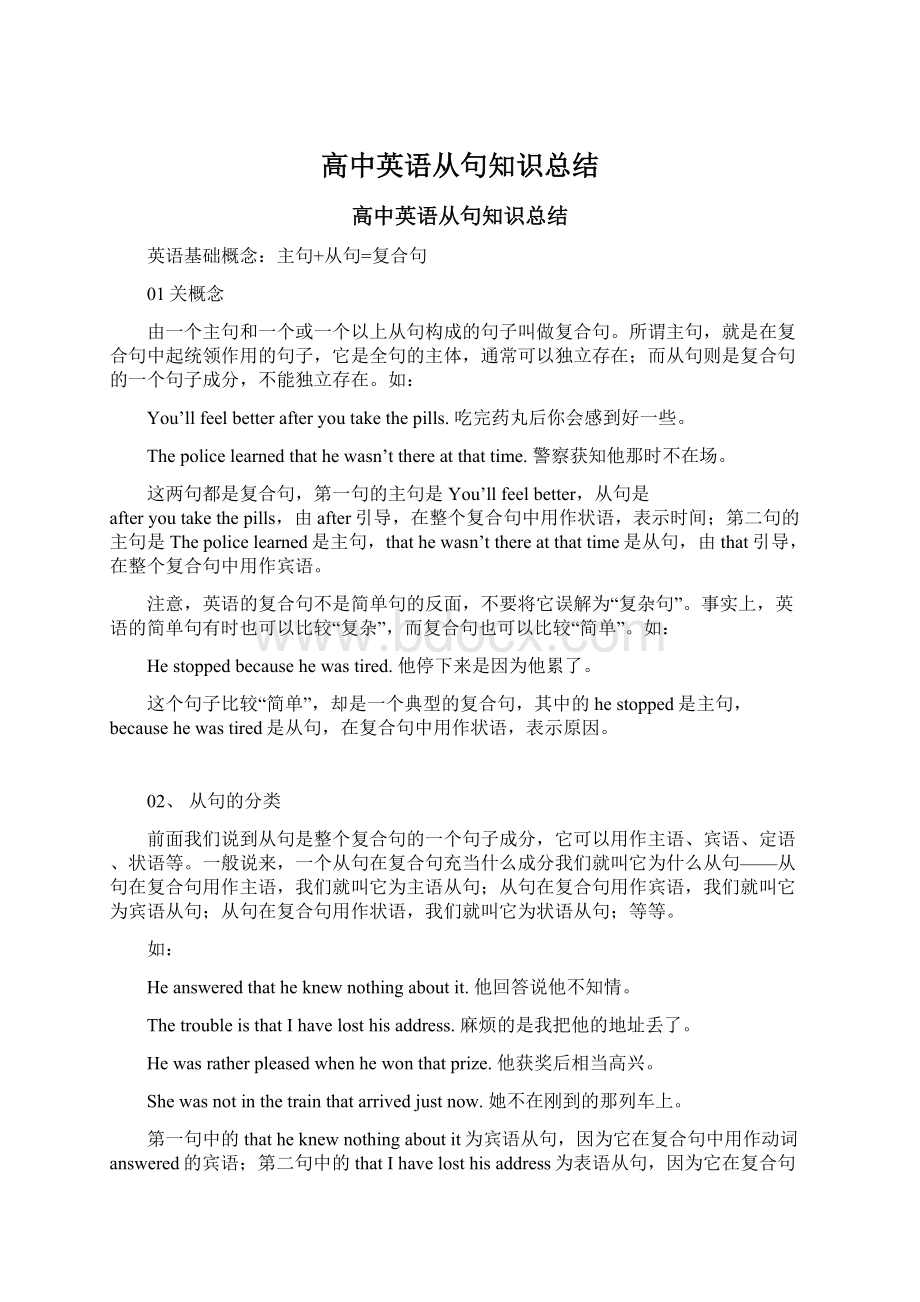高中英语从句知识总结.docx
《高中英语从句知识总结.docx》由会员分享,可在线阅读,更多相关《高中英语从句知识总结.docx(17页珍藏版)》请在冰豆网上搜索。

高中英语从句知识总结
高中英语从句知识总结
英语基础概念:
主句+从句=复合句
01关概念
由一个主句和一个或一个以上从句构成的句子叫做复合句。
所谓主句,就是在复合句中起统领作用的句子,它是全句的主体,通常可以独立存在;而从句则是复合句的一个句子成分,不能独立存在。
如:
You’ll feel better after you take the pills. 吃完药丸后你会感到好一些。
The police learned that he wasn’t there at that time. 警察获知他那时不在场。
这两句都是复合句,第一句的主句是You’ll feel better,从句是after you take the pills,由after引导,在整个复合句中用作状语,表示时间;第二句的主句是The police learned是主句,that he wasn’t there at that time是从句,由that引导,在整个复合句中用作宾语。
注意,英语的复合句不是简单句的反面,不要将它误解为“复杂句”。
事实上,英语的简单句有时也可以比较“复杂”,而复合句也可以比较“简单”。
如:
He stopped because he was tired. 他停下来是因为他累了。
这个句子比较“简单”,却是一个典型的复合句,其中的he stopped是主句,because he was tired是从句,在复合句中用作状语,表示原因。
02、 从句的分类
前面我们说到从句是整个复合句的一个句子成分,它可以用作主语、宾语、定语、状语等。
一般说来,一个从句在复合句充当什么成分我们就叫它为什么从句——从句在复合句用作主语,我们就叫它为主语从句;从句在复合句用作宾语,我们就叫它为宾语从句;从句在复合句用作状语,我们就叫它为状语从句;等等。
如:
He answered that he knew nothing about it. 他回答说他不知情。
The trouble is that I have lost his address. 麻烦的是我把他的地址丢了。
He was rather pleased when he won that prize. 他获奖后相当高兴。
She was not in the train that arrived just now. 她不在刚到的那列车上。
第一句中的that he knew nothing about it为宾语从句,因为它在复合句中用作动词answered的宾语;第二句中的that I have lost his address为表语从句,因为它在复合句中用在连系动词is后作表语;第三句中的when he won that prize为状语从句,因为它在复合句中用状语,表示时间,所以也叫时间状语从句;第四句中的that arrived just now为定语从句,因为它在复合句中用作定语,修饰名词the train。
判断关系代词与关系副词:
方法一:
用关系代词,还是关系副词完全取决于从句中的谓语动词。
及物动词后面无宾语,就必须要求用关系代词;而不及物动词则要求用关系副词。
例如:
This is the mountain village where I stayed last year.
I'll never forget the days when I worked together with you.
方法二:
准确判断先行词在定语从句中的成分(主、谓、宾、定、状),也能正确选择出关系代词/关系副词。
例1. Is this museum ___ you visited a few days age?
A. where B. that C. on which D. the one
例2. Is this the museum ____ the exhibition was held.
A. where B. that C. on which D. the one
答案:
例1 D,例2 A
例1变为肯定句:
This museum is ___ you visited a few days ago.
例2变为肯定句:
This is the museum ___ the exhibition was held.
在句1中,所缺部分为宾语,而where, that, on which都不能起到宾语的作用,只有the one既做了主句的表语,又可做从句的宾语,可以省略关系代词,所以应选D。
而句2中, 主、谓、宾俱全,从句部分为句子的状语表地点,既可用副词where,又因 in the museum词组,可用介词in + which 引导地点状语。
而此题中,介词on 用的不对,所以选A。
关系词的选择依据在从句中所做的成分,先行词在从句中做主、定、宾语时,选择关系代词 (who, whom, that, which, whose); 先行词在从句中做状语时,应选择关系副词 ( where 地点状语,when 时间状语,why 原因状语) 。
语法小知识:
主将从现的标志词
主将从现是一种出现在状语从句中的语法现象,多指在时间状语从句和条件状语从句中,当主句是一般将来时态,则从句要用一般现在时替代一般将来时。
因为主将从现出现在状语从句中,在这里我们就以状语从句的几个类别为根据来列举主将从现的标志性词语。
时间状语从句
when, whenever, since, till, once, as soon as, while, as, before, after
如:
I will be a math teacher when I grow up.
条件状语从句
if, unless, as(so)long as
如:
If I have extra money, I will pay the bill for you.
原因状语从句
because, since, as, for, now that
如:
The tutor will leave here now that you have no problems.
让步状语从句
though, although, even if, even though, however
如:
Though you have advantages in this match, I will not give up.
目的状语从句
in order that, so that, that
如:
In order that Lily can get the prize, we will have a planin detail.
在条件状语从句中,如果主语是一般将来时,从句要用一般现在时。
一个句子的中心意思体现在主句中,所以判断是否使用主将从现首先要做的是区分主从句。
当找到主句,分析其时态为一般将来时或借助某些结构表达将来含义时,则从句使用一般现在时态。
1.用“连词+分词”来替代从句
当主句和从句的主语一致,谓语的时态又是同时段发生,可以把从句的主语省去,变谓语动词为现在分词或过去分词。
如果分词的逻辑或时间意义不明确,还可以保留连词。
Guests mingle while enjoying cake, punch and other treats.
客人们一边吃蛋糕、喝饮料以及享用其它的食品,一边却在一起聊天。
While speaking out against Hitler’s atrocities, the American people generally favored isolationist policies and neutrality.
虽然美国人谴责希特勒的暴行,但是他们却一惯奉行孤立政策和中立态度。
Plastics are materials which are softened by heat and set into lasting form when shaped in a mold.
注:
如果从句的谓语是系动词be,在简化句型时应该把be动词改成being,但是由于being语义意义,所以可以省略,这样就造成了形容词作状语了。
These apples, when ripe, are picked.
这些苹果一旦熟了就要被摘下来。
She knows all the hazards of smoking while pregnant.
她知道怀孕时吸烟的一切危害性。
2. 用“介词+分词”来替代从句
一般说来,用on和at表示“as soon as, once”。
on后面常接“来、去”之类的词,at后面常接“听到、看到”之类的词。
in后面接其他带动作的词,相对于从属连词“while”。
On removing them he was stunned to see that the plates were fogged where the crystals had covered them.
当他把晶体揭开时,发现盘子上方雾蒙蒙,他吃了一惊。
In running down the stairs, I heard the clock struck twelve.
我在跑下楼的时候,听见钟敲了十二下。
He jumped with joy at hearing the news.
他一听到这个消息就高兴得跳了起来。
3. 用“介词+动作性名词”来替代从句
同上面一样,At基本上后接sound,sight“听到、看到”之类的词;on接“回来、到达”之类的词;用in,during表示“when, while”;用over表示“while”之意。
当然,这一切都是相对的分类。
The little girl passed out at sight of a snake.
小女孩一看到蛇就昏过去了。
In our hurry to get from one place to another, we failed to see anything on the way.
当我们急急忙忙从这儿到那儿的时候,一路上什么也没有看见。
On arrival at the railway station, he found the train had already left.
当他到达火车站的时候,他发现火车已经开走了。
He had intended to go, but on second thoughts, he gave up the idea.
他本来想去,但进一步考虑后,打消了这个念头。
During my absence, would you please take care of my cat?
在我不在的时候,请帮我照看一下猫,好吗?
He fell asleep over a book.
他看书的时候睡着了。
After reelection he announces that he will not help.
经过一番考虑后,他宣布将不提供任何帮助。
After graduation, he went to America for his PhD studies.
毕业之后,他去了美国攻读博士。
4. 用“并列句”代替
Two other poses were tried and I emerged from the booth to find a lot people waiting for my signatures.
又试了两个其他的姿势后,我从拍照亭里出来,发现很多人在那里等待我的签名。
名词性从句(主语从句、表语从句、宾语从句、同位语从句)
主语